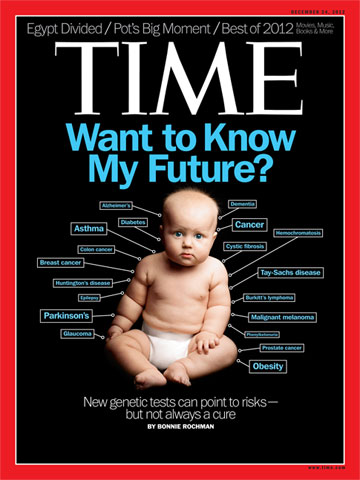
(3 of 6)
"I do believe at some point in time everyone will be genotyped at birth," says 23andMe co-founder and CEO Anne Wojcicki. Her husband, Google co-founder Sergey Brin, has a genetic mutation that increases the risk of Parkinson's disease up to 80%; she has already tested their two children. Wojcicki's grandmother had macular degeneration; when testing revealed that some of Wojcicki's nieces and nephews are at increased risk for it, she bought them high-quality sunglasses. If her kids were predisposed to developing diabetes, she says, she'd encourage healthier eating. "I want to do everything I can to potentially enable my children to be disease-free."
But having more-detailed genetic information does not always point to a clear path. Dr. Ian Krantz and Nancy Spinner, a husband-and-wife team at CHOP, are working with an $8.8 million federal grant to understand what genomic information patients and parents want to know. Most parents go in looking for the cause of a mystery illness. "If you tell parents their child also has an increased risk for colon cancer or breast cancer," says Krantz, a pediatrician who oversees medical-genetics training at CHOP, "that's a whole different level of stress."
If you want to start an argument, ask doctors and patients what they think doctors should do when they discover genetic results they weren't looking for. It can be an emotional blow--and a lifelong burden--if a mom learns that her baby girl carries a mutation that increases her risk of ovarian cancer or a dad finds out that his aspiring linebacker is genetically predisposed to developing Alzheimer's. In focus groups that are part of Krantz and Spinner's study, nearly all the parents said they would want to know about every disease risk, even if there's no treatment available. But in groups of bioethicists, lab directors, geneticists, pediatricians and genetic counselors, the majority said only results that could be immediately acted on should be shared with families.
This year, the lab Spinner runs tested a baby with a mysterious illness and found a completely unrelated mutation that indicated that dementia would likely set in at around age 40. Endless discussions followed: Should they tell the baby's parents that their child would probably develop a progressive neurologic disease marked by incontinence, blurred vision and confusion? There is no current treatment or cure. Telling them would all but guarantee that their child would never be able to get disability or long-term-care insurance. "We came around to the realization that we could not divulge that information," says Spinner, who is a genetics professor at Penn's medical school. "One of the basic principles of medicine is to do no harm."
At about the same time, her lab discovered that a 2-year-old with kidney disease carried a genetic risk for a kind of colon cancer. In some cases, polyps have been known to develop as early as age 7. With this patient, withholding the information would have seemed unethical. "We feel good about that one," says Spinner. "Proper screening can make a huge difference."
